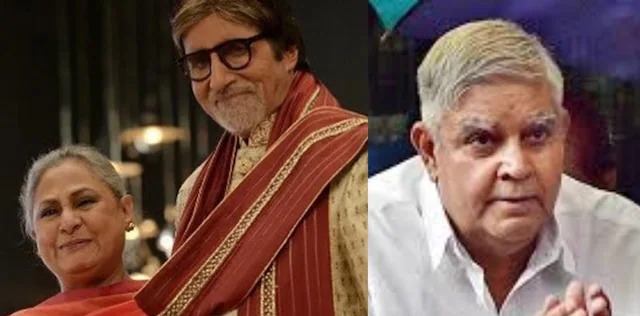In the ever-evolving landscape of Indian politics and celebrity, a recent incident has stirred up significant conversation and, in some quarters, controversy. The unexpected clash between veteran actress and sitting Member of Parliament Jaya Bachchan and Vice President Jagdeep Dhankhar has captured the attention of both the media and the public. At the core of this incident lies the Vice President’s suggestion that Jaya Bachchan change her name — a remark that prompted a passionate response from the accomplished actress. The exchange unfolded during a parliamentary session where discussions on several important socio-political issues were taking place. Jaya Bachchan, renowned for her vocal stance on various matters including the welfare of the film industry and women’s rights, was addressing a critical point. She has often been forthright in her opinions, making her one of the most recognizable faces in the Indian Parliament. However, during this particular session, Vice President Dhankhar’s comment about her name being synonymous with her husband’s, the legendary actor Amitabh Bachchan, sparked a wave of sentiment among many. His suggestion to ‘naam change kar lijiye’ (consider changing your name) implied that she should somehow be defined apart from her husband’s illustrious legacy. In a powerful retort, Jaya Bachchan expressed her frustration with the suggestion and passionately defended her identity. “I am proud of my husband. I am proud of my name,” she asserted, emphasizing that her identity is not merely defined by marriage but by her own accomplishments and contributions to society. Her fierce rebuttal reflects a larger societal issue — the tendency to overshadow women’s individual identities with those of their male counterparts. Her statement resonated with many who believe that women often face undue scrutiny and are sometimes boxed into roles defined by their families. Jaya Bachchan’s position holds particular weight given her stature not only as an actress who has enriched Indian cinema but also as a significant political figure actively participating in legislative processes. The suggestion made by Dhankhar, whether intended as light-hearted banter or an earnest comment, raised critical questions about gender dynamics and the way women’s identities are perceived in both the public and private spheres. In India, where traditional norms still govern many aspects of life, comments like these can reflect persistent patriarchal attitudes — one where women are seen as extensions of their husbands rather than as individuals with their own legacies. Jaya Bachchan’s indignation highlights the need for a more progressive discourse around women and identity. It encourages a reevaluation of how society reacts to strong, successful women who break away from traditional molds. Such conversations are essential in advancing the dialogue around gender equality and women’s empowerment.
Jaya Bachchan ANGRY As VP Dhankhar Suggests ‘Naam Change Kar Lijiye’: ‘Proud Of My Husband Amitabh’

